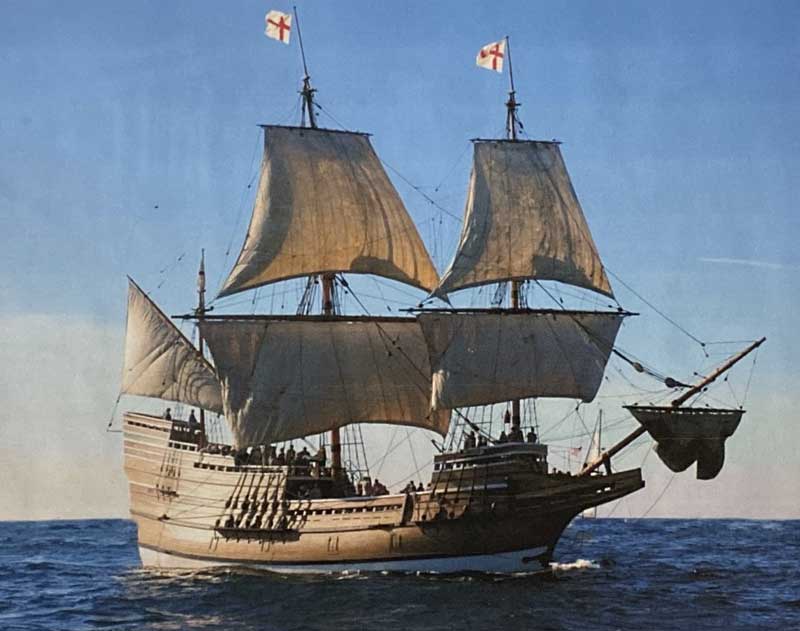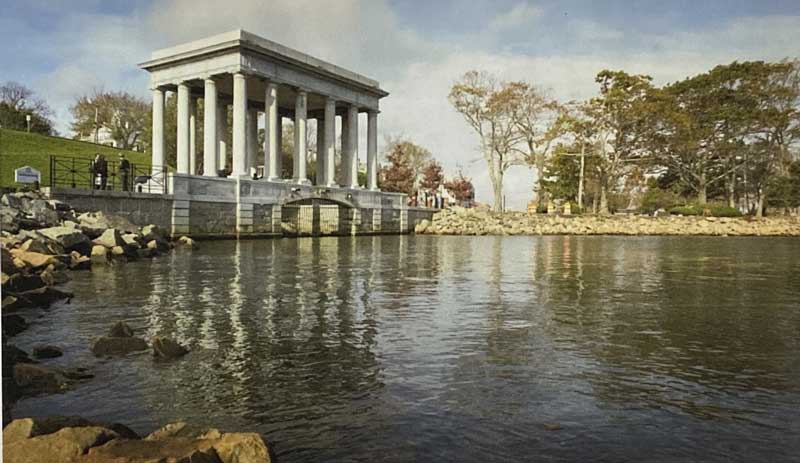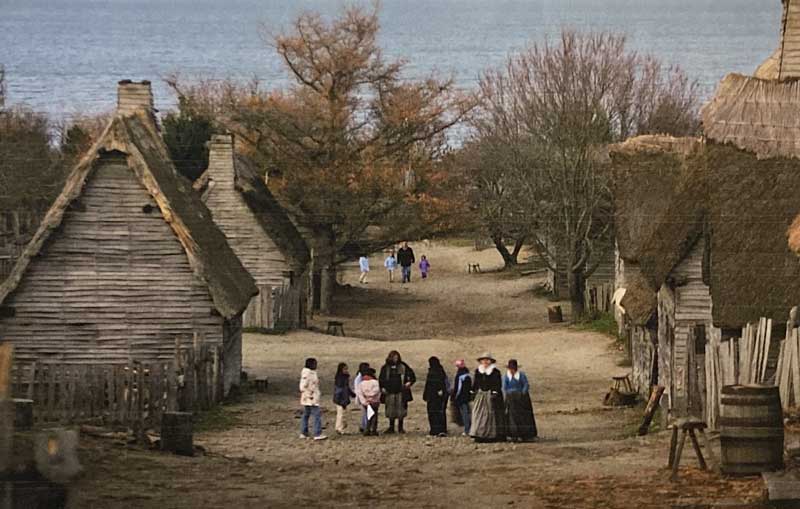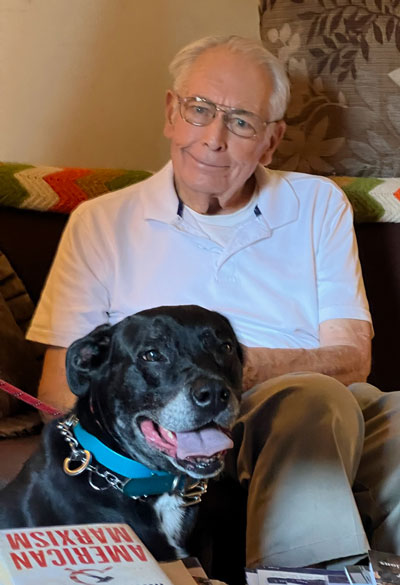“We gather together to ask the Lord’s blessing; He chastens and hastens His will to make known.
The wicked oppressing now cease from distressing; Sing praises to His name, He forgets not his own.
“Beside us to guide us, our God with us joining; ordaining, maintaining His kingdom divine.
So from the beginning the fight we were winning; thou, Lord, wast at our side, all glory be Thine.
“We all do extol Thee, Thou leader triumphant; and pray that Thou still our defender will be.
Let Thy congregation escape tribulation; Thy name be ever praised, O Lord, make us free!”

Who in the Christian world doesn’t recognize that great old Thanksgiving hymn? The words and music are from The Netherlands of the 16th century, and it was arranged in its present form by Edward Kremser (1838-1914). Since the hymn originated in the same country (Holland, or The Netherlands) that our Separatist Pilgrim Forefathers and Mothers lived in as exiles from England from 1608 to 1620 (and for many of those same Separatists much longer than that), I’m sure that our “Plimoth” Pilgrims may have sung that song, or at least a version of it, very often during their 12 year sojourn in Holland, to which they had fled to escape the extreme persecution inflicted upon them by the despised and feared King James and by the harsh hierarchy of The Church of England. (On the other hand, the Separatist Pilgrims sang mostly from the Psalms, so whether or not they ever sang this old hymn I can’t say with certainty.)
Americans of all beliefs do gather together, young and old, families and friends, to “give thanks” at our wonderful Thanksgiving Holiday on the fourth Thursday of every November, which is my favorite holiday. Give thanks for what, you ask? Good question. Give thanks for food, warmth, family, friends, safety, freedom, salvation? Without a doubt. Give thanks for Thanksgiving Day parades, football games, good or “interesting” conversation, naps, chats with family and friends? Surely. Preparing for the annual madness known as “Black Friday”, during which the “poorer angels” of our nature take over, and greed, lust for material goods, bad manners, and just plain “craziness” run rampant. Sadly, yes.
A true day of “Thanksgiving” should center on giving THANKS via prayers to the Giver of Life and all of its richness: Our Heavenly Father. Hopefully some of our people do remember Him and the original meaning of the day. Over the years many groups of people have “gathered together” to thank Him for His blessings on them. One such group in history was the progenitor of this holiday that we celebrate. They were part of a larger group that originated in England, known as Puritans, because they struggled for decades (to little avail) to try to “purify” the corruption and false doctrines and teachings that had crept into the “official” English church; but this smaller band of those Puritans referred to themselves as “separatists” from the Church of England (and separatists from their Puritan Brethren, eventually), because they ultimately came to realize that reforming the Church of England was impossible. Almost from the beginning of our nation, they have been known as “Pilgrims”, for that is what they called themselves.

I’ve written parts of their story in these pages before. They were a unique group of 102 to 104 Christians and unbelievers (probably more unbelievers than separated Christians), who banded together, eventually, to come to the wilderness of North America and start a new colony. I’ll not retell their story here, but if you are not familiar with the REAL story of the people we call “The Pilgrims” (not the lies and the myths), I’d suggest you log on to: www.pilgrimhallmuseum.org/ap_pilgrim_story.htm. Here you’ll get the TRUTH, not politically correct distortions, and not falsehoods engendered by those with “chips” on their shoulders and malevolence in their hearts.
We’ve all learned from our youngest days (well, some of us did) about how the Pilgrims suffered greatly during the extremely difficult first two or three years of their colony at “New Plimouth” (sic). The first winter alone, of 102 (some sources claim 104) Saints (believing ‘separatists’) and Strangers (unbelievers or those who weren’t ‘separatists’), over HALF of them died. Many of the men died; almost all the adult women died; but surprisingly, only a few of the children died (probably because the adults gave them most of the scarce food). Starvation faced them for most of the first year of 1621. Despite these hardships, which few modern people could withstand, the surviving Pilgrims all refused Capt. Jones’ offer to return them to England when the Mayflower left them in the Spring of 1621. Despite their difficulties, most of them DID give thanks to God.
Surely it can be said that God, in His wisdom and providence, protected His people within His Will. How so, you might ask, considering that half of them died that first winter and spring? Let me tell you how God, in His Divine Plan, and for His reasons (which I admit are somewhat unfathomable to me), protected those whom He willed to survive. In the bitter winter of 1620/21, when the Pilgrims didn’t yet have all of their humble homes built, and most of the women and children still lived aboard the Mayflower, God sent an Abenaki “sagamore” (strong man) Native Person (from what is now the State of Maine) named “Samoset” into their midst. On March 16, 1621, he walked boldly through the middle of their humble uncompleted village, on First Street, now called “Leiden Street” in modern day Plymouth, Massachusetts (which I have walked up several times in the recreated “1627 Plimouth Plantation” and in the modern town of Plymouth), and greeted the Pilgrims in English, saying “welcome, Englishmen”!

God’s second “miracle” was His sending of Samoset into their midst that day. He had learned his English language from English sailors and fishermen around Monhegan Island, in what is now the State of Maine. Samoset “bade them welcome, informing them that he had learned some English among the Englishmen that came to fish at ‘Monchiggon’”, according to Pilgrim Edward Winslow’s 1622 book titled, “Mourt’s Relation”. After having been provided food and drink, and spending the night with the amazed Pilgrims, he left them, promising to return in a day or two.
God’s third “miracle” came in the person of the Native man who probably saved the Pilgrims from starvation. Two days after Samoset left them, he returned with this man, whose Patuxent Tribal name was “Tisquantum”, but who we know better as “SQUANTO”. Possibly in his mid-30’s when he met The Pilgrims, he had an amazing history that surely God had arranged just for that special day on March 18, 1621. On a return journey to his Patuxent Tribe within the Wampanoag Confederacy (near present day Plymouth, Mass.) in 1614, Squanto was abducted by an English seaman, Thomas Hunt, who was one of Captain John Smith’s officers. Hunt planned to sell fish, corn, and a group of abducted Indians when they returned to Europe, probably in Spain. Later, in Spain, Squanto was rescued from slavery and befriended by some local Catholic Friars, who began to teach him about Catholic Christianity, plus their Spanish language.
Eventually the Catholic Friars arranged for Squanto to travel to London, because he was desperate to return home to his tribe near Plymouth. In London he lived and worked with John Slany, a shipbuilder, who taught him English. Slany took Squanto to Newfoundland in 1617, then back to England. Still determined to get home, in 1618 he met Sir Ferdinando Gorges (ca.1565/68-1647), in London and asked him to aid him in returning to his home in North America. (Gorges was a naval and military commander in his life and at this time was the Governor of the Port of Plymouth, in England, and thus had some influence among the groups who were attempting to colonize “New England”). We know that “God moves in mysterious ways His wonders to perform,” for in 1619 Squanto finally returned to New Plymouth, site of his former home, aboard John Smith’s ship. Upon arriving at what was once his village, Squanto discovered that ALL the Patuxent—his people—had been killed off in 1618 by some epidemic or plague, possibly smallpox. All except Squanto, who wasn’t with his tribe!
We know from Gov. William Bradford’s journal, Of Plimouth Plantation, that Squanto settled with the Pilgrims where his former village once stood (modern day Plymouth, Massachusetts). That the English survived the first year or two was miraculous in itself, for Squanto taught them the Patuxent method of cultivating maize (corn). He taught them how to fertilize their crops using the fish from the local streams, one of which (Town Brook) flows right through Plymouth (I’ve walked beside it a couple of times). He taught them how to hunt for local wildlife. Essentially, he saved their lives! I’ve already mentioned the second and third “miracles” in this tale of survival. What was the “first” miracle? Well, the Pilgrims never intended to land at “New Plimouth”, but were supposed to settle at another far away place on the North American coast, near Hudson’s River, in what is now New York State. The FIRST MIRACLE was that God brought them TO THE VERY PLACE where there were no longer any hostile Native tribes who would resist their settlement—the local tribes having been eradicated by an epidemic of some kind! Thus, the rapidly dwindling band of Pilgrims, relatively small to begin with, were spared further deaths in battles with the local Native People.
There were many other “miracles” of survival in the first precarious years of the Plymouth Colony. But what I call Miracle #4 was later recorded by Gov. William Bradford. In 1622, on a return trip to Plymouth, after a meeting to heal damaged relations between the Wampanoag and his Pilgrim friends, Squanto became sick with a fever: “…Squanto fell ill of Indian fever, bleeding much at the nose…, and within a few days he died. He begged the Governor (Bradford) to pray for him, that he might go to the Englishmen’s God in heaven, and bequeathed several of his things to his English friends…. His death was a great loss.” Thus, at age 37, Squanto entered into the Presence of His LORD and Savior!
For what shall we give thanks this Thanksgiving Day, my friends? Besides thanking our Heavenly Father for our Salvation and our many blessings, despite the political upheavals all around us, let’s thank Him for the miraculous early beginnings of the Pilgrim Colony at New Plimouth—a colony that became the first permanent and successful English forerunner of what would become the United States. Plus let’s give thanks for His amazing providence in sending two humble Native People to aid the Pilgrims at their time of greatest need. That truly was MIRACULOUS! That truly was, in my opinion, God’s Will!













